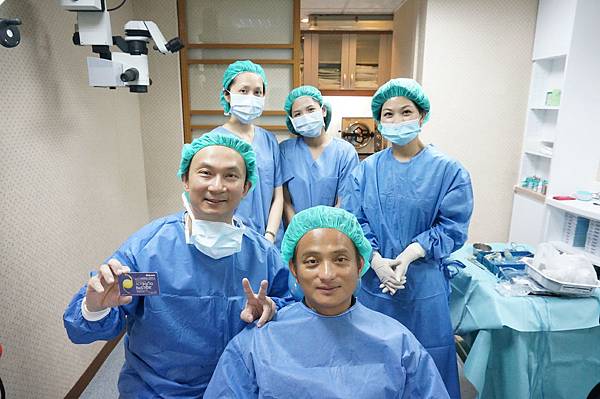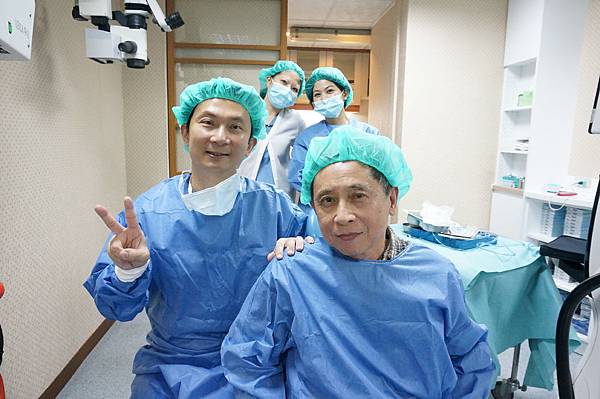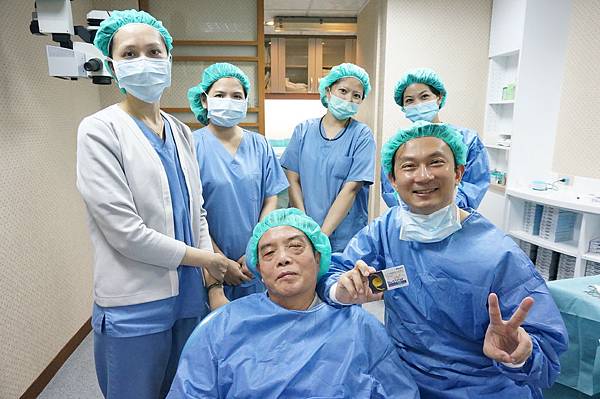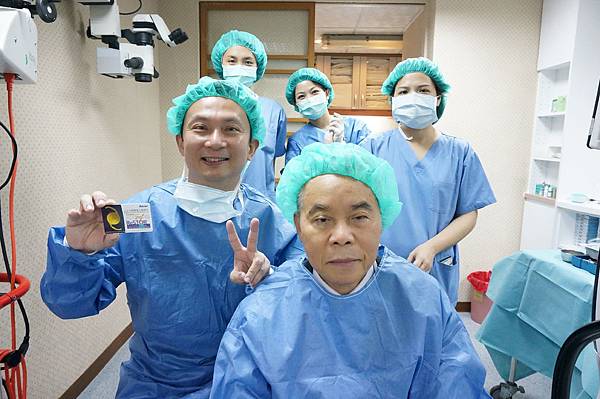<<泌尿科攝護腺肥大用藥會影響眼科白內障手術>>
眼科診所中多數需要進行白內障手術的病人都是50多歲以上的中老年人,其中的男性也有一部分都有在使用泌尿科藥物控制攝護腺肥大,這類藥物會阻斷幫助瞳孔放大的α1A,手術前若服用抑制幫助瞳孔變大的藥物,手術過程中易使瞳孔越來越小,虹膜也容易從傷口鼓出,而增高手術的困難度,相對也增加風險。在手術當中,有可能傷害虹膜,而引起嚴重併發症。
80多歲的謝先生,五年多前在台北市某家醫院進行第一次白內障手術,但是手術時因為疑似眼壓高,虹膜不斷鼓出,前後處理了二次,這樣的經驗讓患者很害怕另一眼白內障的手術,以致右眼白內障這五年來越來越嚴重,視力僅剩0.1 (20/20),在非不得已的情況下,接受住在我們診所附近的親友介紹而來求診。蕭醫師在手術前詳細詢問患者病史及用藥後發現,病人有服用前列腺肥大藥物(Tamsulosin),才會在施行白內障手術時,導致虹膜相對容易鼓出,增加白內障手術時的風險。蕭醫師注意到這個藥物特有的副作用,於是在手術時特別謹慎小心處理,謝先生在最近一次回診視力也回到我們預估的1.0(20/20)水準之上,病人開心的說:『我的白內障問題終於順利畢業了!我不再害怕開白內障手術了!』
威力揚眼科手術影像導引系統(VERION Image Guided System)
參考資料:
https://www.myalcon.com/products/surgical/verion-guided-system/
The VERION™ Image Guided System: Precise Surgical Planning and Procedures
Joining other advanced technologies from Alcon, the VERION™ Image Guided System is designed to offer improved precision, consistency and control in cataract refractive surgery.
The VERION™ Image Guided System Can help:
- Minimize data transcription errors
- Improve clinical efficiency
- Increase toric and multifocal IOL confidence
- Ensure surgical consistency
- Optimize visual outcomes
Intraoperative floppy iris syndrome associated with tamsulosin
Paul R. Brogden, Oliver C. Backhouse, and Manuel Saldana
Leeds, United Kingdom by e-mail
Author information ► Copyright and License information ►
Copyright © the College of Family Physicians of Canada
Tamsulosin, an α1-adrenergic blocking agent, is prescribed for symptoms of benign prostatic hypertrophy. In 2005 over 1.6 million prescription items of tamsulosin were dispensed in England. Intraoperative floppy iris syndrome was first described in the medical literature in April 2005, and there have been 16 subsequent related peer-reviewed publications. There is, however, no mention of the association in the current edition of the British National Formulary. Intraoperative floppy iris syndrome occurs in approximately 2% of all cataract-surgery patients and is characterized by billowing and prolapse of the iris through the corneal incisions and progressive pupillary constriction. This leads to a more complex surgery and a higher rate of complications. Many eye units now advise patients to discontinue tamsulosin for 2 weeks before cataract surgery and to start taking it again immediately after surgery, though the syndrome can occur in patients who stopped therapy 1 year before surgery. The condition is associated with all the α1-adrenergic blocking agents but is much more commonly seen with tamsulosin, which is highly selective for the α1A receptor. These particular receptors are present in bladder-neck smooth muscle and in the iris dilator muscle. Blockage of this latter muscle allows unopposed action of the parasympathetically innervated iris constrictor muscle and loss of iris tone, resulting in the clinical syndrome. Intraoperative strategies for reducing the risks during surgery have been described and include the use of iris hooks and intracameral phenylephrine.
We would like to raise awareness about this condition among primary care physicians and to advise that the use of α1-adrenergic blocking agents should be documented on referrals for cataract surgery. Such patients are at higher risk of problems both from cataract surgery and from the urologic effects of the temporary cessation of treatment.





沒有留言:
張貼留言